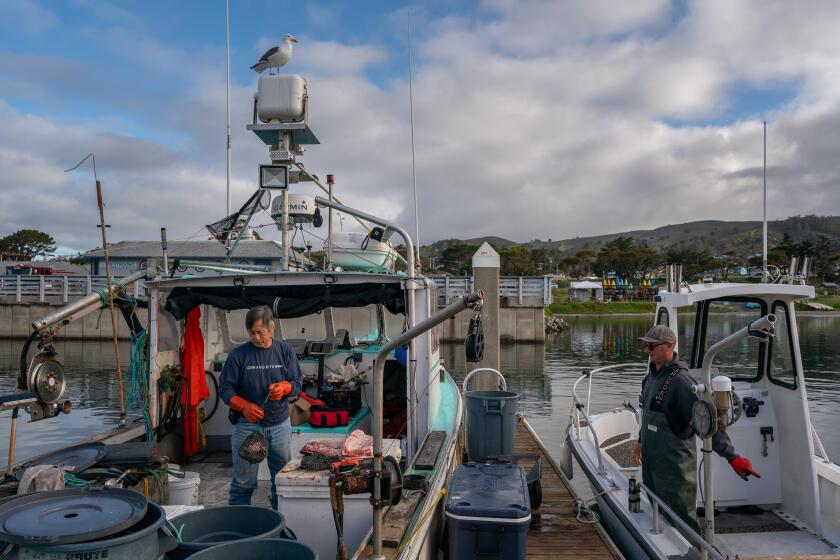Rancher Saddled With Problems
For Slick Gardner, starting a horse sanctuary on his 2,000-acre ranch must have seemed like a great idea at the time.
But that was before outraged animal lovers got together and before the county he once called “the Soviet Union of Santa Barbara” came down on him. It was before local officials conducted what they said was probably the largest seizure of neglected horses ever in the United States, and before Shoshone elders likened Gardner’s treatment of their horses to the government’s treatment of them.
For the record:
12:00 a.m. Sept. 29, 2004 For The Record
Los Angeles Times Wednesday September 29, 2004 Home Edition Main News Part A Page 2 National Desk 2 inches; 68 words Type of Material: Correction
Horse rancher -- A profile of Santa Ynez Valley rancher Slick Gardner in Sunday’s California section said that a Nevada man, Clifford Dann, was arrested in 1992 after blocking a Bureau of Land Management horse roundup by threatening self-immolation after dousing himself with gasoline. The article should have added that Dann also splashed a bureau ranger with gasoline and was convicted of assaulting a federal law enforcement officer.
Now Gardner, 57, who has pleaded no contest to felony charges of animal cruelty and grand theft, faces up to a year in jail and restitution of at least $220,000 to the county. Meanwhile, county officials, who say they can’t afford even temporary care for about 400 still-homeless horses, are relying on the kindness of volunteers for about $800 a day in hay and veterinary bills.
At best, Gardner’s story, which has as many sharp turns as the racetracks he used to drive, is one of good intentions gone terribly wrong.
Gardner, who is to be sentenced Oct. 6, declined to be interviewed.
But his attorney, Steve Balash of Santa Barbara, said his client wasn’t quite the villain that prosecutors had made him out to be.
“Slick really isn’t a bad guy,” Balash said. “It’s not as if he’s torturing animals. He simply can’t feed them properly.”
A longtime resident of the Santa Ynez Valley, Gardner is a larger-than-life figure in some ways. Years ago, he was an owner of the Green Monster, a jet-powered vehicle that set speed records at Utah’s Bonneville Salt Flats. A NASCAR competitor at one time, he named his son Slick Racin Gardner because he and his wife were at the Ontario Speedway when she went into labor. In 1996, Racin Gardner competed in the Indianapolis 500.
When neighbors in 2002 heard about Slick’s horse sanctuary, some were enthusiastic.
“I was so excited when I first saw the mustangs on Slick’s property,” said Myrt Starr, a Solvang resident who runs a petting zoo. “Then it turned into this horror story.”
Starr founded a small group called Wild Horses in Need, which is finding places that can adopt horses from Gardner’s ranch in groups of 20 to 30. The group has started a website, wildhorsesinneed.org, held a benefit concert, bought newspaper ads, placed about 150 horses at a ranch near Lake Casitas and raised $100,000, Starr said.
But funds have dwindled and the group, together with the Texas-based U.S. Equine Sanctuary and Rescue, is trying to line up homes at animal refuges and raise money to transport the hundreds of horses still on Gardner’s ranch.
“They brought us 15 babies the other day,” Starr said. “You should see them. Their little black legs drag, their eyes are glazed, they’re skin and bones.”
The foals were born to some of the more than 500 wild horses that Gardner acquired, in part, from roundups by the federal Bureau of Land Management in Nevada. As the herd expanded, Starr, who was raised on a ranch in Arizona, saw the animals growing more emaciated instead of less.
“I was watching 60 stallions in a canyon really close,” she said. “There was nothing left to them but bone. They were nearly dead.”
An acquaintance of Gardner’s since she worked as a waitress years ago, Starr said she called him several times.
“What the devil are you doing?” she recalled asking him. “Feed those horses!”
Starr said she told animal control officers about conditions on Gardner’s ranch but, even after an inspection, they took no action.
“I hid in the brush and watched” as the officers drove by, she said. “They never even slowed up.”
Many of the horses sprang from another drama that was taking place in the remote reaches of north-central Nevada.
The Bureau of Land Management was closing in on Mary and Carrie Dann, two elderly sisters and members of the Western Shoshone tribe. For three decades, the bureau had alleged that the Danns let their horses run wild on public land without paying grazing fees and trespassing penalties of more than $3 million.
The sisters insisted that they owed nothing because the 1863 Treaty of Ruby Valley had designated the land in question, several hundred thousand acres, as tribal property.
Through the years, skirmishes between the sisters and the government had taken some nasty turns. In 1992, their brother Clifford was arrested after blocking a bureau roundup by dousing himself with gasoline and threatening to strike a match.
Now, when Slick Gardner offered to buy more than 200 of their horses for $1 a head and pay transportation costs to California, the Dann sisters saw at least a temporary solution.
It would be a way to keep part of the herd together and out of the bureau’s grasp. And Gardner talked about setting up children’s programs, building a tepee outside his ranch, and seeking publicity not just for the horses but for the tribe, said Julie Fishel, an attorney with the Western Shoshone Defense Project. On top of that, she said, Gardner assured the sisters they would be able to get their animals back after the dust cleared.
“The worst thing that we thought would happen is that he’d steal the horses and never give them back,” Fishel said. “We never thought he’d starve them -- ever.”
As time wore on, the sisters grew heartsick when they heard what was going on in Santa Barbara County.
After a six-month criminal investigation, the county seized 167 of the horses on Gardner’s ranch in September 2003, alleging that some were on the verge of starvation. Three months later, a county hearing officer denied Gardner’s request for their return, citing “concentration camp conditions” at his ranch.
In addition to charges of animal cruelty, Gardner was charged with theft for allegedly writing an $11,000 bad check to the Dann sisters. A plea agreement reached this month reduced his possible maximum sentence from 10 years in prison to one year in county jail.
The Dann sisters were pleased.
Before the plea agreement, Gardner told reporters that he was the victim of a vendetta by Dist. Atty. Tom Sneddon.
But Balash, Gardner’s attorney, paints a more sympathetic picture of a client who was the victim of too much ambition and not enough grass.
“The grass on Slick’s ranch doesn’t support that kind of herd,” he said. “The county has spent a fortune on this case, but if we’d just gotten some hay, they could have saved the whole thing.”
More to Read
Start your day right
Sign up for Essential California for news, features and recommendations from the L.A. Times and beyond in your inbox six days a week.
You may occasionally receive promotional content from the Los Angeles Times.







